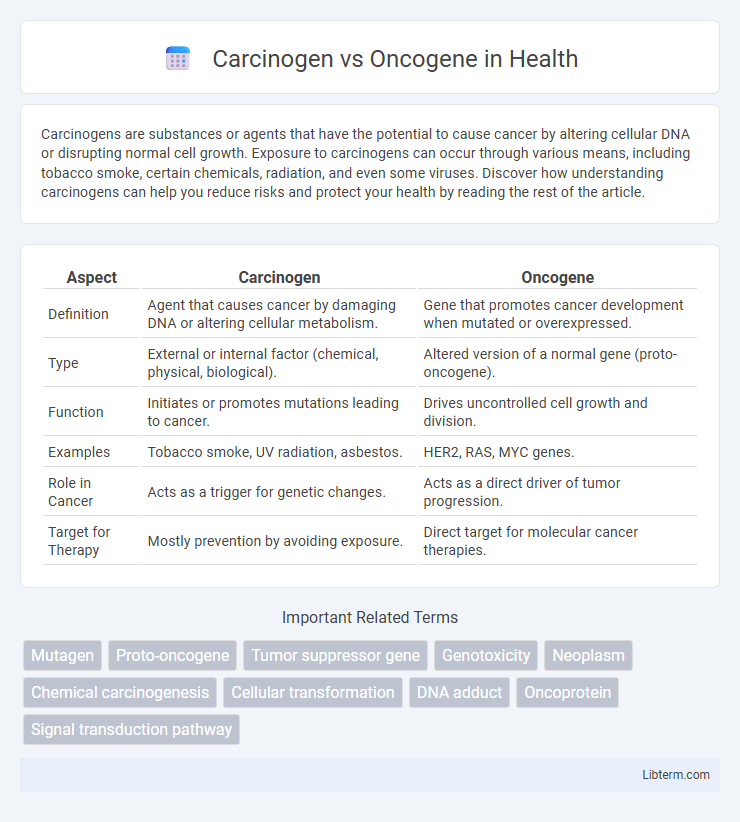Carcinogens are substances or agents that have the potential to cause cancer by altering cellular DNA or disrupting normal cell growth. Exposure to carcinogens can occur through various means, including tobacco smoke, certain chemicals, radiation, and even some viruses. Discover how understanding carcinogens can help you reduce risks and protect your health by reading the rest of the article.
Table of Comparison
| Aspect | Carcinogen | Oncogene |
|---|---|---|
| Definition | Agent that causes cancer by damaging DNA or altering cellular metabolism. | Gene that promotes cancer development when mutated or overexpressed. |
| Type | External or internal factor (chemical, physical, biological). | Altered version of a normal gene (proto-oncogene). |
| Function | Initiates or promotes mutations leading to cancer. | Drives uncontrolled cell growth and division. |
| Examples | Tobacco smoke, UV radiation, asbestos. | HER2, RAS, MYC genes. |
| Role in Cancer | Acts as a trigger for genetic changes. | Acts as a direct driver of tumor progression. |
| Target for Therapy | Mostly prevention by avoiding exposure. | Direct target for molecular cancer therapies. |
Introduction to Carcinogens and Oncogenes
Carcinogens are substances or agents that cause genetic mutations leading to cancer by altering cellular DNA, often through exposure to chemicals, radiation, or viruses. Oncogenes are mutated forms of normal genes (proto-oncogenes) that, when activated, promote uncontrolled cell division and tumor development. Understanding the role of carcinogens and oncogenes is crucial in cancer research for identifying causes and developing targeted therapies.
Defining Carcinogens: Agents of Cancer
Carcinogens are substances or exposures that cause mutations or DNA damage leading to uncontrolled cell growth and cancer development. These agents include chemicals like tobacco smoke, physical factors such as ultraviolet radiation, and biological agents like certain viruses. Understanding carcinogens is essential in cancer prevention, as they initiate the cellular changes that oncogenes later promote for tumor progression.
Understanding Oncogenes: Genetic Drivers of Tumorigenesis
Oncogenes are mutated or overexpressed versions of normal genes called proto-oncogenes that regulate cell growth and division, playing a critical role in tumorigenesis by promoting uncontrolled cellular proliferation. These genetic drivers alter signaling pathways, leading to the activation of proteins such as Ras, Myc, and HER2, which are frequently implicated in various cancers. Understanding the molecular mechanisms of oncogene activation enables targeted cancer therapies, including tyrosine kinase inhibitors and monoclonal antibodies, aimed at disrupting aberrant oncogenic signaling.
Key Differences Between Carcinogens and Oncogenes
Carcinogens are external substances or agents, such as tobacco smoke or UV radiation, that cause mutations leading to cancer, whereas oncogenes are mutated or overexpressed genes within cells that drive uncontrolled cell growth and tumor development. Carcinogens initiate DNA damage or alter cellular processes, while oncogenes function as the internal genetic factors promoting cancer progression. Understanding these differences highlights carcinogens as environmental triggers and oncogenes as molecular drivers in the cancer pathway.
How Carcinogens Induce Genetic Mutations
Carcinogens induce genetic mutations by interacting directly with DNA, causing structural alterations such as base substitutions, deletions, or insertions that disrupt normal gene function. These mutations can activate oncogenes or inactivate tumor suppressor genes, leading to uncontrolled cell proliferation and cancer development. Chemical carcinogens like polycyclic aromatic hydrocarbons and physical carcinogens including ultraviolet radiation are well-known agents that cause these mutagenic effects.
Mechanism of Oncogene Activation in Cancer
Oncogenes drive cancer progression by promoting uncontrolled cell proliferation through mechanisms such as gene amplification, point mutations, and chromosomal translocations. These genetic alterations lead to the production of hyperactive or overexpressed proteins that continuously signal for cell growth and survival. Unlike carcinogens, which cause DNA damage leading to mutations, oncogenes directly alter cellular signaling pathways to initiate and sustain tumor development.
Common Examples: Carcinogens vs Oncogenes
Carcinogens include substances such as tobacco smoke, asbestos, ultraviolet radiation, and aflatoxins, all known to cause DNA damage leading to cancer. Oncogenes, like HER2, RAS, and MYC, are mutated or overexpressed genes that drive uncontrolled cell proliferation in various cancers. Understanding the roles of these carcinogens and oncogenes is crucial for cancer prevention and targeted therapy development.
Environmental vs Genetic Risk Factors
Environmental carcinogens include tobacco smoke, UV radiation, and certain chemicals, which cause DNA damage leading to cancer. Oncogenes are mutated forms of normal genes (proto-oncogenes) that, when altered by genetic risk factors, promote uncontrolled cell growth and tumor development. Both environmental exposures and inherited genetic mutations contribute to cancer risk by interacting and influencing oncogene activation and carcinogenic processes.
Prevention and Detection Strategies
Carcinogen prevention involves minimizing exposure to known cancer-causing agents such as tobacco smoke, ultraviolet radiation, and certain chemicals through lifestyle changes and regulatory measures. Oncogene detection requires advanced genetic screening techniques like PCR and next-generation sequencing to identify mutations responsible for uncontrolled cell growth. Early intervention based on these detection methods enhances targeted therapies and improves patient outcomes.
Future Research Directions in Cancer Biology
Future research in cancer biology will deepen the understanding of carcinogen interactions with genomic stability and epigenetic regulation, aiming to uncover precise molecular mechanisms triggering cancer initiation. Investigation into oncogene signaling pathways will advance targeted therapies, utilizing CRISPR and single-cell sequencing to identify novel oncogenic drivers and resistance markers. Integration of multi-omics data with artificial intelligence promises accelerated discovery of personalized treatment strategies that modulate both carcinogen-induced damage and oncogene activation.
Carcinogen Infographic

 libterm.com
libterm.com